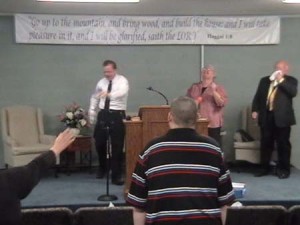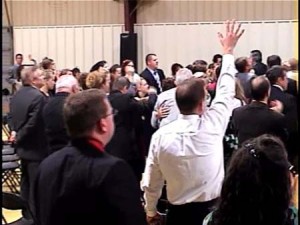It is always an adventure pushing the legacy of Peoples Temple and Jim Jones Thought in a traditionally conservative area, especially here in rural Lexington County, South Carolina. For those of you who are not familiar with the area, think back to last year when Republican Representative Joe Wilson shouted “You lie!” to Barack Obama during the president’s health care speech to Congress. Rep. Wilson is based out of Lexington County, and his offices are located in West Columbia, just on this side of the Lexington County line from the capital city of Columbia.
During 2008, members of the Rural People’s Party Central Committee covertly inserted ourselves into various religious organizations in the rural Lexington County area, specifically the “Oneness Pentecostal” or Apostolic denominations, who trace their theological lineage from giants like William Branham (who once shared a podium with Jim Jones early on during Jones’ preaching career). Due to their emphasis on the Acts of the Apostles, some of the traditional articles of faith of the Apostolic denominations (such as pacifism, still present in many written charters) have given them a leftist tilt at times in their history. But the climate of the conservative South (which sends many young men and women into combat) had chiseled away at these. As a result, our members’ emphasis on “sharing all things in common” and bringing homeless people into the church from nearby urban Columbia was perceived as less than favorable.
Many communists might look upon our activity within the Oneness Pentecostal/Apostolic circles as suspect, due to what – in our opinion – is a naive belief among a contingent of First World communists that all political activity must by default primarily be “above-ground.” Analysis of politics in general seems to prove otherwise. Our approach, however, is based upon the approach that Jim Jones himself took, realizing that the quintessence is more important than the outer covering, and that it is sometimes more efficacious to be implicit than explicit.
In discussions on various online forums for communists where non-members have brought up the RPP for discussion, we have observed a common criticism concerning Jim Jones’ communist bona fides: “Why did he start a church?” These same people seem to forget that Joseph Stalin began his political activity at Tiflis Theological Seminary as a seminarian, and that Kim Il Sung organized many pre-revolutionary anti-imperialist activities while an accomplished organist at his parents’ Presbyterian church in Korea. Jim Jones had this to say about Kim Il Sung – the other ideological guiding light of the Rural People’s Party – on November 1st, 1978:
WPK [Worker’s Party of Korea], the general staff of the Korean Revolution. The Workers Party of Korea, the DPRK: that beautiful, practical, lovely co-operative country that we saw on our TV station, where all the children eat rice as a staple food, and how healthy they look, and how vigorously happy, enthusiasm on all their faces; it would be good if Marceline could have that set up in her room so she could see it. Nothing would warm the heart more than the joy that was in the faces of the Korean people. The Workers Party of Korea is a party founded and led by President Kim Il Sung, the grand and great leader of the revolution, is in the vanguard detachment of the Korean working class and other working masses. Kim Il Sung’s party is a revolutionary party of new type that has inherited the glorious revolutionary tradition that was built up by President Kim Il Sung during his long-drawn anti-reactionary and anti-Japanese struggle.
At the peak of the RPP’s involvement in local Pentecostal and Apostolic circles, two members of our organization were married in a ceremony at a local Apostolic church on November 18th, the anniversary of the Peoples Temple martyrdom. The RPP cadre were heavily involved throughout the service. The prelude to the ceremony was “Hold On, Brother” from the Peoples Temple album He’s Able, and the Peoples Temple favorite “Marching to Zion” – the rendition used for the 1980 television movie Guyana Tragedy: The Story of Jim Jones – was used for the wedding march. The gathering afterwards was multi-racial and progressive in tone. Although no longer involved with the same organization, the RPP continues to work within religious circles in line with the example given to us by Jim Jones and Peoples Temple.
In 2009, RPP cadres who have been recruited inside prisons to the state north of us took a bold stand to protest unsanitary conditions in the kitchens of institutions in the North Carolina Department of Corrections. This culminated during summer of 2009 with press coverage in the Raleigh, North Carolina newspaper News & Observer. Correctional authorities subsequently launched an investigation concerning sanitary conditions at one institution which resulted in several contracted correctional officers on the kitchen staff being fired. Certain key individuals associated with RPP were classified as members of a “security threat group” and shipped to other institutions focused on anti-gang programming.
Communists believe that one must always be cognizant of changing material conditions in applying revolutionary strategy and tactics. Jim Jones and Peoples Temple certainly held this to be true: Jones went above and beyond what would be considered “acceptable” or “standard” for an American communist of his time and because of this he was able to accomplish much on-the-ground. RPP does not claim to have even a portion of the dynamic that Peoples Temple had, nor do we believe that current material and social conditions in the United States could manifest a movement such as Peoples Temple at this present time. That circumstance, however, may change. In the meantime, however, while we continue to work with his spirit in mind, we intend to continue to carry the positive image of Jim Jones and Peoples Temple forward into the future and preserve his legacy, both by our ideology and by our works.
(James Williams is on the Central Committee of the Rural People’s Party. For more information on the Rural People’s Party, visit their website. More detailed articles on the Rural People’s Party perspectives on Peoples Temple include Honoring the Legacy of the Peoples Temple Martyrs of November 18th, 1978, and Comrade Jim Jones: The Nature of the Theoretical Task. A photograph of one of the Central Committee members on pilgrimage to the former Los Angeles site of Peoples Temple – as well as a photo of the church itself – is here.)

